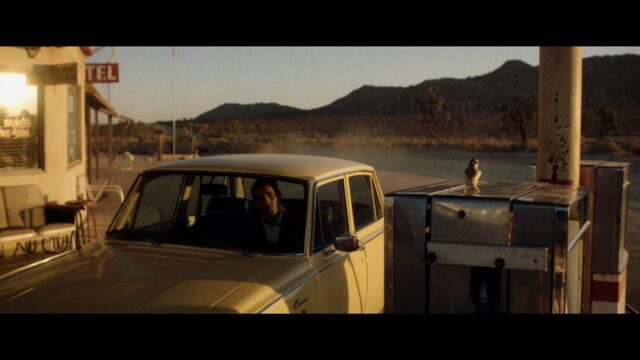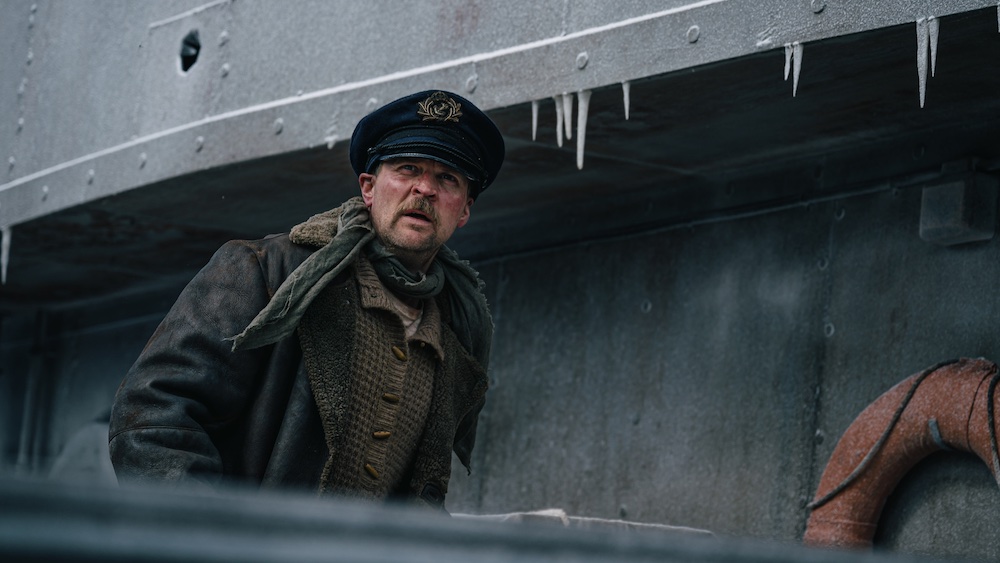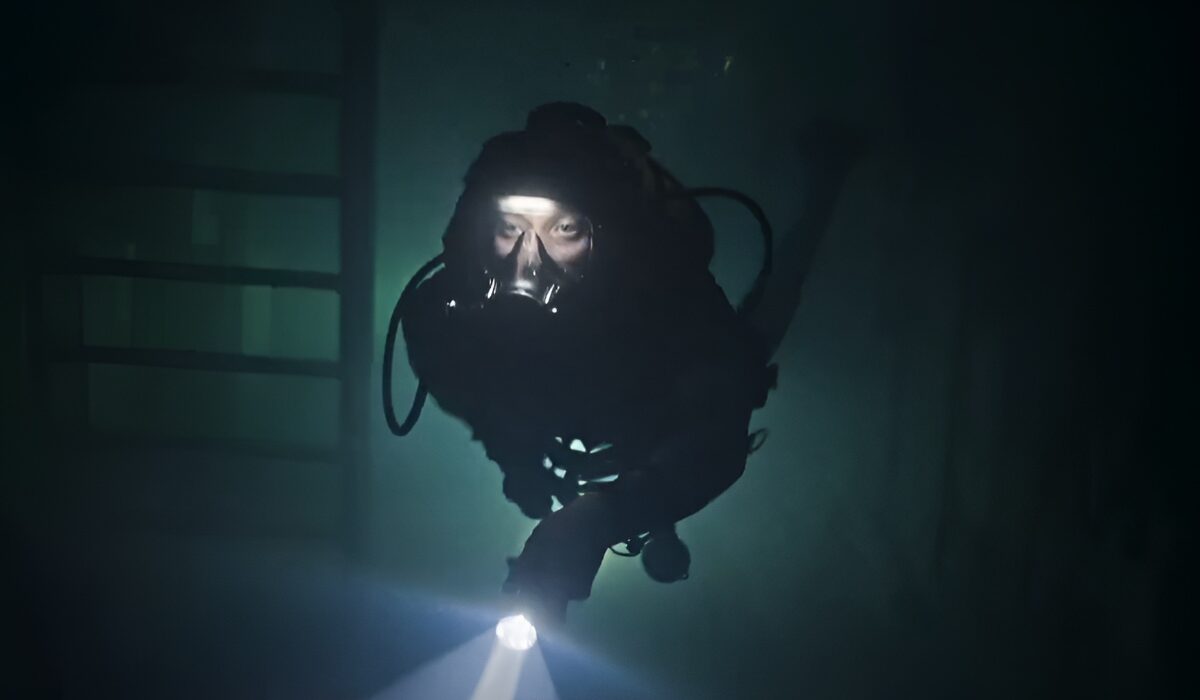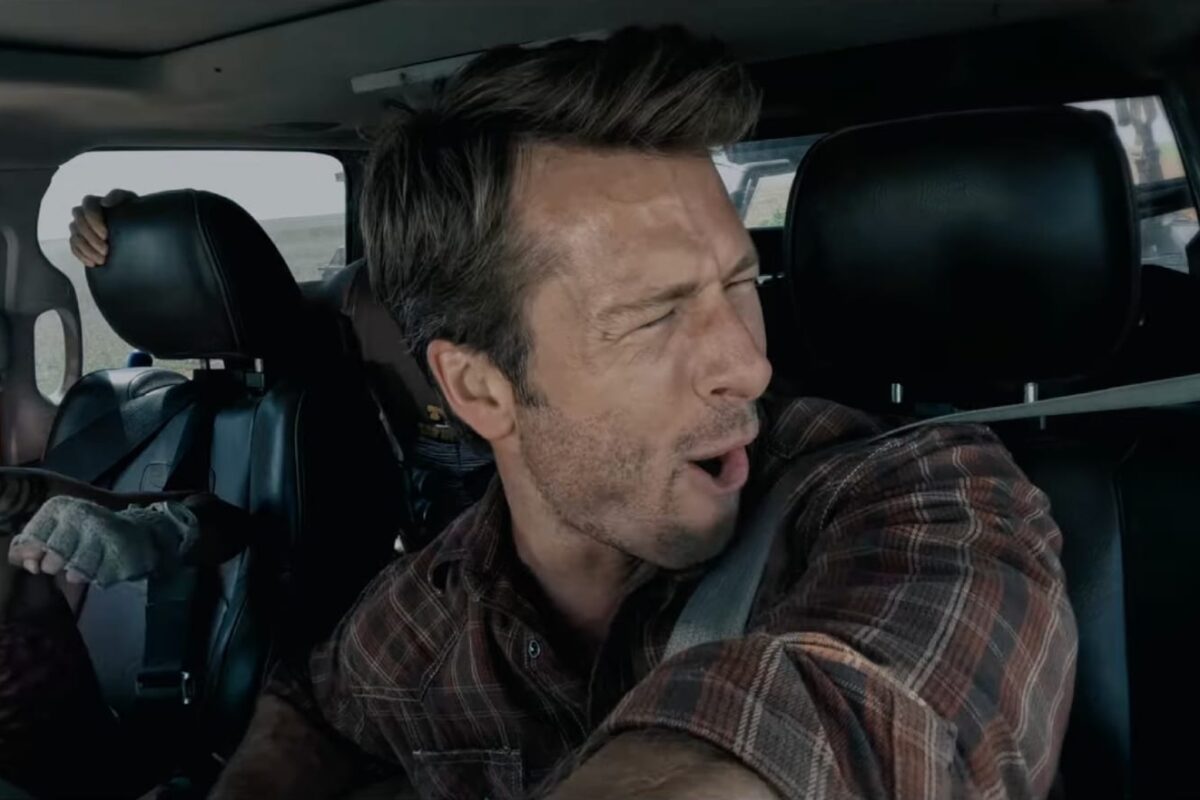
Brian: Thank you for sitting down with me. The first thing I want to ask you about; how did the idea for the Last Stop in Yuma County come about and also, can you talk about the films and filmmakers that influenced it?
Francis Galluppi: Yeah. Well, I think the catalyst for the script was really just, “how can I write something contained? With not a lot of money, not a lot of time.” I had written my short films based on locations that we had access to, like for free. We were doing them for a couple of hundred dollars, usually at my friend’s desert house, used my buddy’s cabin and drove all my friends out to Oregon, shot there, and basically wrote the script based on the locations. When it came time to write this feature, I sort of took the same approach. I found Four Aces, this movie set in Lancaster, and I was like, “this is really fucking cool”, it has sort of this 70’s throwback. So, I went there, took a bunch of pictures, started to draw the overhead of the diner and crafted the script around that. That was sort of the catalyst for it, it was like write to the location. Also, I went there and was able to get a good rate on it and I also really do love single room movies like Rope, Dial M For Murder, The Sunset Limited. So, I had watched a lot of stuff like that and seen what I liked. The challenge was trying to find a way to do this and not make it feel like a stage play. You know, in those movies where you can kind of pick them apart and what kind of feels like a stage play and what doesn’t. On top of a single room stuff, I would say Don Siegel, Sam Peckinpah, just like those gritty 70’s. Obviously there’s a lot of stuff in Last Stop that’s like, you know I love movies. I mentioned Rififi and BadLands but just like film noir as well. There’s a lot of Noir in Last Stop. A lot of people say Western but it’s definitely, for me, more of a Noir.
Brian: Yeah, that’s what I thought as well and I’m a big Noir fan. I did catch the Badlands reference in the movie. I did like that, you don’t hear that too much. I think Robert Rodriguez once said “when it comes to shooting a low budget movie, you shoot what you own” like in El Mariachi he had a turtle, that’s why there’s a turtle is in the movie.
Francis: Exactly.
Brian: On that take of low-budget and filmmaking, that’s what you do.
Francis: The same goes with writing too, right. If my family watches Last Stop, they would say “I know why you wrote rhubarb pie in there, I know why you did this.” When you write, you gotta put some personal stuff in there.
Brian: I agree. So, everything does take place, for the most part, from one location. Was that always the plan, and listening to you I’d say it probably was, and also, I think you already answered, but where did you find that fantastic diner and hotel?
Francis: It’s funny because that is a very overused diner. I didn’t know that when I first found it and I was like “this place is amazing” and then I started writing the script and doing the shot listing and now I see it, so many fucking commercials and music videos, movies and TV shows and I’m like “oh, goddammit”. Thankfully, nobody had said anything. It’s actually funnier, the composer [Matthew Compton] did Palm Springs, which also shot at that same location and I was sitting there with him, in the room, and he said something like “I feel like I ate at this diner before” and I was like, “no dude, you scored a movie that we shot at this diner” and he was like “What!?”, it was funny. He didn’t even realize it. They shot House of A Thousand Corpses there and lots of movies, it was a trip.
Brian: So, it’s a star.
Francis: Exactly, yeah.
Brian: What was your shooting schedule like?
Francis: It was twenty days and you know, typical shooting in the desert so, unexpected weather, shit that just threw everything off. It would just be like, full on rain storms out of nowhere. There’s actually a shot in the movie where Jim’s [Cummings] across from Jocelin [Donahue] doing the knife sales pitch and it’s pouring rain outside. Like, there’s literally equipment blowing across the window, it’s really wild. On the day, I was like “well we clearly fucking have to reshoot this, this is insane” but it’s actually in the movie and I barely can tell.
Brian: I think it was the shade too, that giant shade that was covering it.
Francis: Yeah, yeah, exactly. But, yeah, if you look closely you can see it. The desert is just like, you wake up and have no idea what today is going to look like.
Brian: It doesn’t always follow your schedule. (Laughs)
Francis: Hell, no. (They both laugh)
Brian: You mention the cast. The cast is fantastic, I think everyone played their part to perfection. How did Jim Cummings and Richard Brake get involved? Because in my opinion Jim Cummings both makes everything better.
Francis: Yeah, yeah. So, Rich was the first person to read the script. Our executive producer, James [Claeys], who sold his house to finance the movie, had a loose connection with Rich and sent it to him and we jumped on call with him, this was probably two and a half years before we started production. So, we had kind of been like keeping in touch through email and talking a little bit and I’d get excited because I’d think the movie was a go and then I’d have to call him back and be like “never mind, it’s not happening.” Finally, two and a half years later, I called him and said, “okay, it’s actually happening this time.” Rich was a huge fucking supporter of it through the entire time, like every time I called him, he was in.
Jim; we were with another company and we wanted a bigger movie star for the knife salesman and they were just throwing names at me that made no sense at all, you know. And the whole time I was like, “it’s got to be Jim.” I’m also a huge fan of Jim’s movies but I just knew he had to do this movie. So, I wrote him a letter, he read the script, he called me that night and was like, “hey, do you want to come over for coffee” and I’m like, “yeah, okay.” We just talked about South Park and movies and just, you know, shot the shit and at the end he was like, “yeah, I want to do this movie.” Once Jim signed on, that was the moment where I was like, okay, tonally I know what this movie is. After spending a year and a half, then throwing down the names, you’re like “well, maybe I can make this work” and you start to kind of switch the tone in it, like inherently switch it and like okay, maybe I can get on board with this person and just kind of do this and find a way to finesse it and pivot it a little bit. But, once Jim was on, I was like “yes, this is the movie I wrote. That’s on the fucking page.”
Brian: That’s fantastic. He’s great, he kind of brings a certain little thing to most of his roles and this one, he’s fantastic. Speaking of your script, what was actually the most difficult on the page when you were writing it?
Francis: That’s a good question. God, it’s been years since I wrote that script, I’m trying to think. I guess I would say the scene where David [Sam Huntington] and Sarah [Alexandra Essoe] show up with the baby. Just because I feel like I was rewriting and rewriting and rewriting. We prepped so much for this movie, like we used a shot designer, we storyboard, we photo board, we pre-vised a lot of stuff. We showed up on set with a very, very clear idea of what we were doing and a fucking thought out plan for everything. But then, before we shot the scene on Monday, over the weekend I was panicking and I was like, “that scene doesn’t work” and I actually rewrote that scene over the weekend and showed up with a whole new scene. (They both laugh) I ended up rewriting that scene like the day before and then showed up. And this is actually really funny, I rewrote that scene, and I’m trying to say this without spoilers, I handed out the signs to Alex Essoe and Sam Huntington and Jim goes in his trailer and he’s reading it and he comes back out and he goes, “okay dude, wait, hold on. So, you want me to have a fucking freak out monologue in a parking lot?” And I was like, “yeah, what’s the problem?” And he was like, “Dude,” and I was like, “Oh, oh, fuck.” And then I realized, “You’ve done this in Thunder Road, you’ve done this in The Beta Test, you’ve done this in The Wolf of Snow Hollow”, it was really funny. (They laugh) Clearly, I probably subconsciously knew that but I just wasn’t fucking thinking. (Brian laughs) I love that moment. But, yeah, probably that was the hardest thing to write. I only say that because of how many times I went back and rewrote it and rewrote it. Where some of the other stuff, like the shootout for instance; that was the first draft, done, I never changed anything.
Brian: Talking about that, what was the most difficult thing to shoot?
Francis: I mean, for all different reasons, some of the long oners were difficult to shoot. The vertigo shot was difficult to shoot, it was like twenty something takes, you know. We were trying to do it with a whip and it was just difficult. But, then, there’s other challenges like the ending, you know what I mean; that was challenging because it was like, the fire department came and was like, “you can’t do this, the wind is too high”, you know, it’s a lot of moments where I was like, “oh, fuck. We’re going to have to pivot and figure out another way to do this.” The hardest was probably that one oner where Jim comes out of the diner, that was all on steadi-cam and cars kept driving by, we’d be in a middle of take and I’d be like, “this is perfect, this is the one” and a fucking bike would just be like “vroooooommm” and I’m like, “Fuck!” (Laughs) So, yeah, that one shot took like a full day.
Brian: Wow. I was just curious, you’re pulling triple duties on this film. You wrote and directed it but you also edited. So, the editing process, is obviously the final stage of the story telling. Were there any decisions you had to make in that process like that you couldn’t do or did you discover anything new while you were editing the movie?
Francis: Honestly, man, because we went in there and the way my DP [director of photography] and I prepped, to be honest, it was sort of like paint by numbers. Like, we didn’t get any coverage, there was no other way to cut this movie. We did a lot of long takes and with zero coverage. I had a first cut, like a rough cut, in like three weeks, but obviously from there it was just trimming things down, working on timing. Then you get really granular and you start playing around like, “maybe I cut one frame, two frames”, you know. I’m trying to think if there was anything that really came out. Nah, it was all pretty much planned dude. (Brian laughs) Yeah, I don’t think I really found anything. Like, there was for Connor’s [Paolo] character, playing the deputy, he did some improv that was fun to kind of poke around in the edit and find takes but for the most part, like I said, it was pretty much plug and play, that was the only option, you know.
Brian: No, no, like I said, you did everything so like the story is already in your head, you did the editing process and kind of all you’re doing is trimming down the pieces.
Francis: Totally, yeah.
Brian: So, that makes sense.
Francis: Yeah, and every time someone was like, “you should work with an editor” and I was like, “that just doesn’t make sense to me,” like I kind of already have the movie edited in my head before we shoot it. And maybe that’s not the greatest thing, maybe it should go to an editor who can find a new sort of way to cut this thing but for me I’m like, “no.” My fucking OCD is like, “I already know how it’s supposed to be.”
Brian: I’m a big Kevin Smith fan, he does the same thing in all his movies, he edits all his movies. He talks multiple times about how he edits, like he’s pretty much editing while he’s shooting.
Francis: Yeah, I was editing on the weekends too. So, I was coming to set on Monday being like, “here you guys go, check out the scene we shot last week” or whatever. I also love Kevin Smith. The Snowball Effect is like; have you seen that doc [documentary]?
Brian: No, I have not.
Francis: Oh, dude, it’s amazing. You have to check it out.
Brian: I will, I don’t think I’ve ever heard of it.
Francis: Yeah, it’s about the making of Clerks.
Brian: Oh, no, I haven’t seen it. I’ve obviously been a fan of his for a long time, I listen to all his podcasts so I feel like I’ve heard every single thing he can possibly say.
Francis: Of course.
Brian: But, I have to watch that.
Francis: You should. It’s just cut so well, man, it’s really good.
Brian: I will, thanks for the recommendation. I want to ask you about the importance of the bird, which I believe is the opening and, I know for a fact, the closing shot. So, what was the significance of the bird, what did it symbolize for you?
Francis: For me, this movie has always been about fate in a way, right? Like, he shows up and the universe is like testing the knife salesman’s morality. So, he shows up and this bird is there and it’s staring at him, it goes away, everything happens, here’s all these things that are testing him and it gets to the end and it’s like the bird’s back, like “see, I told you bitch.” (They both laugh) “I’ve been watching you”, you know. Then, obviously, the whole money slapping the bird is sort of self explanatory.
Brian: How many takes was the first shot, to get that bird to stay on that gas can? (Laughs)
Francis: It was crazy. It was actually the first take.
Brian: Wow.
Francis: I mean, we ended up doing four takes. I got a little puppet from Amazon, like a bird puppet, and went to the gas station and I had Mac [Fisken] shoot it, and then my buddy pulled up and I was like, “this is what I needed to do” and the motel door opens, the bird flies away. I sent it to him and he’s like, “alright, cool, I can train this bird in like two weeks” and I was like, “okay.” (Brian laughs) Yeah, I had no idea it was going to go so smoothly but it did.
Brian: Wow, that bird is literally sitting there as the car pulls in and the door opens and he’s not moving, that’s awesome.
Francis: It’s fucking nuts, right? And it’s all practical, man. We just put some bird seeds on the pump and then we had the cage next to it and it was covered, I’m telling you it was awesome. (They both laugh) Anyway, the cage was covered, with some new team, and I think once I said “door”, the guy just lifted up the cage and the bird just flew in, it was wild.
Brian: Wow, that’s crazy. The last thing I really want to ask you about is the ending. Was the ending always the planned ending or did it change any in your process of writing or filming?
Francis: No, that was always the ending.
Brian: The way the movie is, you could see, and this is just an opinion, you could see where you could play with characters, like we’re going to make this person’s perspective, we’re going to have a waitress or we’re going to have the redhead girl, you know, like you could extend it. If you were to like pivot or did you know it was going to be the knife salesman?
Francis: Okay, yeah, I know what you mean. It was always the knife salesman, like when I first pitched it I was like, “it’s about a traveling knife salesman”, you know what I mean? It’s just funny because for like fifty minutes of the movie you almost forget about him and then it becomes his movie. That was always the thing I was most excited about was letting the audience in and it’s weird because some people, when I show the fuel truck in the beginning, a lot of people haven’t caught like, “oh, fuck, that’s the fuel truck, gas isn’t coming.” It’s cool to see some people getting it and some not but obviously when we get back to the end it’s like, CLAP, that was it the whole time. I always knew it was letting the audience in on something that none of the characters know. So, it was like the fuel truck is showing up, but we showed the fuel truck, it’s not fucking coming. And I always knew I wanted to bring it back there. And, yeah, it took forever to find that location. That was one where I was very, very specific, I’m like, “it needs to be on a hill and by water” and all these little things and we just scouted everywhere. Actually, that ending is all a cheat, like there’s no road near that ravine. You know, movie-making. I mean, it’s close by, but it’s not what you think it is.
Brian: That’s what making a movie is all about, it’s magic, it takes places that you weren’t really at and it can make things happen. It’s a great film, I’m really looking forward to other people seeing it. I really appreciate your time.
Francis: Of course, thank you, Brian.





